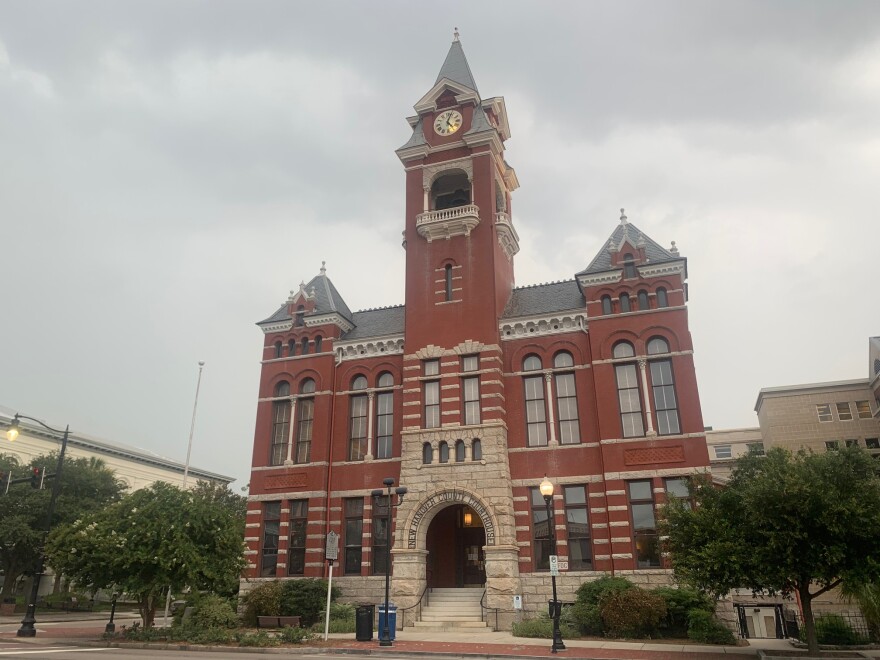Right now, the combined state tax and county sales tax in New Hanover is 7% — with county tax at 2%. The proposed increase would raise that to 7.25%. For a $100 dollar purchase, that’s an increase of a quarter.
The county estimates the increase would produce an additional $144 million dollars over the next decade, assuming about 3% annual growth in the region (a relatively conservative estimate, given the population increases expected in coming years).
According to County Manager Chris Coudriet, that money would go into four main categories.
“So it's bike and ped. It is certainly support for wave, it begins to build some financial capacity to do rail realignment, and then it [begins] to plan for and prepare for bus rapid transit. Those are the four broad categories that if the plan went forward as presented, that's how the money would flow over the first 10 years, about $144 million," Coudriet said.
The proposal lays out how that money would be divided up, with roughly 40% going to bike and pedestrian paths in the city and county, 15% going to rail realignment, and 45% going to WAVE and Bus Rapid Transit.
The 'bike and ped' projects would include paths in the beach towns — but these do not come with strings attached. In the past many residents have asked for a bus route to Wrightsville Beach, to avoid the town's ever-increasing parking rates, but to date the town has declined to allow a bus stop on its side of the drawbridge. Coudriet confirmed that funding for bike and ped projects in Wrightsville Beach would not require the town to change that stance.
The funding for rail realignment could be used in a variety of ways and would be contingent on how the overall project develops, including how funding is allocated by other partners, including but not limited to the City of Wilmington, the North Carolina DOT, and federal transportation agencies.
It's important to note, Coudriet said, that the proposed division of funding is not ironclad — current and future boards can change the categories, spending more, less, or nothing at all on any particular item. What commissioners can’t do, by law, is spend the tax revenue on anything that isn’t defined as public transportation, according to Coudriet.
Commissioners also can’t use the sales tax to supplant — that is, swap in for — existing funding to free it up for other projects (in other words, they can't engineer a 'workaround' for the restrictions on spending the sales tax revenue).
Approval and implementation
If Commissioners approve the measure on Monday, there will be a required public hearing, at least 60 days before the General Election in November. Coudriet said he recommends that be held in July — in order to give commissioners time to weigh public sentiment and, if warranted, start the process of removing the tax increase from the ballot. Barring that the sales tax increase will go on the ballot, passing if it gets over 50% of the vote.
But Coudriet notes the final decision is still up to the board of commissioners, who would need to take another vote after the general election to implement the tax. That vote could take place with the current board in late November or December of 2022 or with a potentially new board in 2023, if one or both of the commissioners up for reelection — Rob Zapple and Chair Julia Olson-Boseman — lose their seat.
After that approval, the county will notify the state, and the sales tax would be implemented at the beginning of the next fiscal quarter, meaning the earliest the tax increase could actually show up on a purchase in New Hanover County would be April 1.
Both votes — to put the increase on the ballot, and to implement it — require only a regular majority of three commissioners.
Support
The proposed sales tax increase came out of the same series of joint city-county conversations that generated the idea for the $50 million affordable housing bond — which, after several deaths and reincarnations, now appears to be completely off the table.
While the specter of last year's tax increase appears to have made the housing bond politically untenable, commissioners have been more sanguine about the sales tax increase. That's in part because the third-party polling conducted by the Wilmington Chamber of Commerce showed generally positive reactions to the sales tax compared to more mixed reactions to the housing bond.
Related: After nixing housing bond, NHC commissioners spar with city council, approve $15-million alternative
At the most recent joint meeting in February, officials unexpected pumped the breaks on the sales tax — with county Chair Olson-Boseman citing the Russian invasion of Ukraine as a reason to pause the process. However, in an interview after the meeting, Olson-Boseman said she supported the sales tax measure and believed the board would vote in favor of it.
Still, taxes — and tax increases — are likely to be a driving issue in the 2022 election, and it's unclear what impact that will have on the future of transportation funding.
Upcoming meeting
The New Hanover County Board of Commissioners will meet on Monday, March 21, at 4 p.m. in Room 301 the Historic New Hanover County Courthouse.


